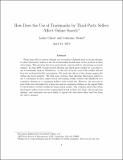How Does the Use of Trademarks by Third-Party Sellers Affect Online Search?
Author(s)
Chiou, Lesley; Tucker, Catherine Elizabeth
Downloadchiou and tucker.pdf (642.7Kb)
OPEN_ACCESS_POLICY
Open Access Policy
Creative Commons Attribution-Noncommercial-Share Alike
Terms of use
Metadata
Show full item recordAbstract
Firms that sell via a direct channel and via indirect channels have to decide whether to allow third-party sellers to use trademarked brand names of products in their advertising. This question has been particularly controversial for advertising on search engines. In June 2009, Google started allowing any third-party reseller of a product to use a trademark such as “DoubleTree” in the text of its ad, even if the reseller did not have the trademark holder's permission. We study the effects of this change empirically within the hotel industry. We find some evidence that allowing third-party sellers to use a trademark in their online search advertising weakly reduced the likelihood of a consumer clicking on a trademark holder's paid search ads. However, the decrease in paid clicks was outweighed by a large increase in consumers clicking on the unpaid links to the hotelier's website within the main search results. Our evidence shows that when a third-party seller focuses on a trademarked brand in its ads, the ads become less distinct, and customers are more likely to ignore the advertised offers and buy from the direct channel.
Date issued
2012-08Department
Sloan School of ManagementJournal
Marketing Science
Publisher
Institute for Operations Research and the Management Sciences (INFORMS)
Citation
Chiou, L., and C. Tucker. “How Does the Use of Trademarks by Third-Party Sellers Affect Online Search?” Marketing Science 31.5 (2012): 819–837.
Version: Author's final manuscript
ISSN
0732-2399
1526-548X